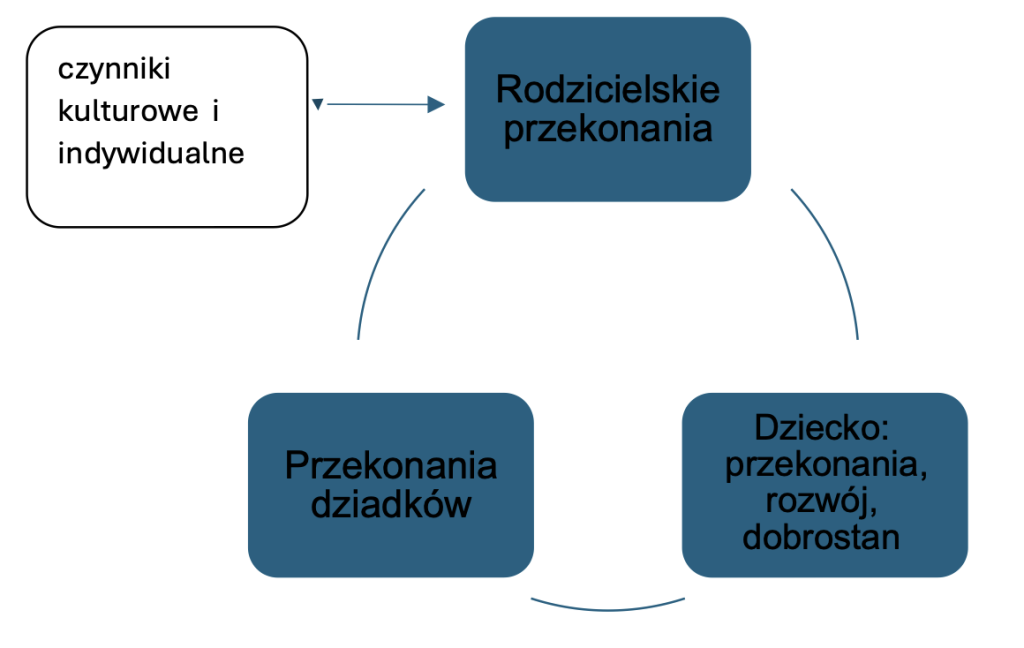Project Leader: Prof. Dr. hab. Marta Białecka
Parents’, Grandparents’, and Children’s Beliefs about Development and Education: How Culture Shapes Children’s Development and Well-Being
Although as early as 1963 developmental psychology demonstrated that children’s behaviors influence parents and their attitudes or parenting styles, the number of educational studies conducted in Poland in this area remains limited. From the perspective of cross-cultural and cultural psychology, Poland, given its history, is situated precisely at the intersection of individualistic Western cultures and collectivist Eastern cultures. A broader sociological perspective on family research reveals that Poland is a country where families remain more inclusive than those in Western Europe or the USA (e.g., 32% of families in Poland are transgenerational, including grandparents [1,2]).
Based on these three premises, we plan to conduct research aimed at describing parents’ and grandparents’ beliefs about child development and examining how these beliefs influence children’s well-being, as well as whether children’s behaviors and beliefs can, in turn, affect parents and grandparents (Fig. 1).

Parental beliefs, conceptualized as an important component of caregiver psychology [3] or as a type of attitude toward one’s own competencies [4], represent, from a systemic perspective [5], a form of adults’ social cognition. Previous studies [6] have confirmed the intergenerational transmission of parental beliefs [from parents to children], but no comprehensive research has been conducted involving three generations [grandparents–parents–children] or studies examining the influence of children’s beliefs on parental beliefs [e.g., beliefs about climate change]. Highlighting the content scope of beliefs, it should be noted that caregiver psychology aligns with, and even constitutes an important aspect of, their evaluative judgments and broader value systems [7]. Therefore, an essential aspect of the planned project will be to incorporate cultural and cross-cultural perspectives [8] into our research.
Examples of specific research questions we aim to address include:
- How are grandparents’ and parents’ beliefs related to children’s development and well-being?
- Do parents’ beliefs differ from non-parental adults’ beliefs about child development and education?
- Is parental self-efficacy related to their beliefs about child development?
- Are parents’ beliefs about child development stable, or do they change over a three-year period?
To empirically test hypotheses derived from these questions, we plan to develop appropriate tools, e.g., by translating original questionnaires into Polish and preparing reliable Polish versions through several pilot studies. Short-term longitudinal studies, including online research, are the preferred method for testing systematic, bidirectional relationships (see Fig. 1).
In international collaboration, we plan to examine approximately 300 parents and children, and 600 grandparents from the same families in Poland, the United Kingdom, and China.
References
[1] Bożewicz, M. (Ed.). (2019). Preferowane i realizowane modele życia rodzinnego. CBOS
[2] Danielsbacka, M., Křenková, L.,Tanskanen, A.O. (2022). Grandparenting, health, and well-being: a systematic literature review. European Journal of Ageing 19, 341–368. https://doi.org/10.1007/s10433-021-00674-y
[3] Harkness, S., Super, C. M., Blom, M. J., Moscardino, U., Bonichini, S., Rios, M., … i Zylicz, O. (2023). Culture and the Challenges of Being a Good Parent. Emotion Regulation and Parenting, 189.
[4] Dweck, C. S. (2021). Toward an integrative theory of motivation, personality, and development. Handbook of personality, 83-103.
[5] Newman, B. M., i Newman, P. R. (2022). Theories of human development. Routledge.
[6] Miller, S.A. (2020). Parent’s beliefs about children. Oxford University Press.
[7] Schwartz, S. H., & Cieciuch, J. (2022). Measuring the refined theory of individual values in 49 cultural groups: psychometrics of the revised portrait value questionnaire. Assessment, 29(5), 1005- 1019.
[8] Boski P, Różycza-Tran, J., Sorokowski, P. (2023) Podróże psychologiczne przez kultury świata. Soruc
